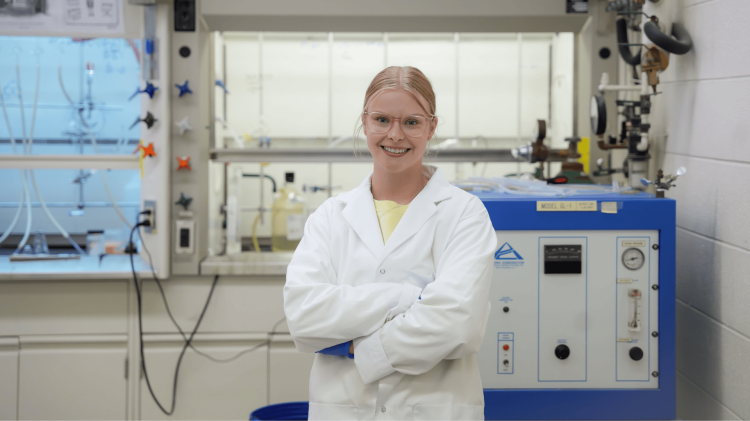At the University of Waterloo, researchers are addressing complex challenges to solve real-world problems. Fifth-year chemistry student Allysa Greidanus is working in Dr. Graham Murphy's chemistry lab on a project to develop purification methods that make recycling wastewater possible.
The team is collaborating with deutraMed, a deuterium science and innovation company based in Collingwood, Ontario, to analyze, evaluate and purify deuterium oxide (D2O) wastewaters for refining and reuse.
Deuterium oxide or "heavy water" is a stable, non-radioactive isotopic variant of water (H2O), where the hydrogen (1H) atoms are replaced with their heavier isotope deuterium (2H, or D). While deuterium oxide is historically known as a key component of the CANDU (Canada Deuterium Uranium) nuclear reactors for generating electricity, numerous important non-nuclear applications have also emerged.
"While bulk D2O is a critical resource for generating electricity in nuclear reactors, its modern applications in pharmaceutical science and in the development of advanced organic materials such as OLEDs have created a rapidly growing demand for this resource," Murphy says.
Refining scarce deuterium from natural sources is expensive, and the goal of the partnership with deutraMed is to develop environmentally sustainable processes for purifying industrial wastewaters, allowing the residual deuterium content to be recycled, refined and ultimately returned to the global economy. By decontaminating industrial waste, deutraMed can start its refining process using more concentrated deuterated material, which offers a significant advantage.

"Recycling wastewaters will restore this rare and expensive material to ensure these industries have access to the heavy water they rely on," Greidanus explains.
In the lab, Greidanus is putting the theory she has learned in the classroom into practice. "I run small-scale distillations and ozonolysis experiments using wastewater samples from industrial sources," she says. After running purity control tests, she sends the treated samples back to deutraMed for analysis. "They test to see whether my methods are working and what levels of purity they're hitting."
Enriched research experiences like this are made possible through mutually beneficial partnerships with local industry, such as Waterloo's collaboration with deutraMed. This partnership is facilitated by Dr. Pavel Gris, chief scientist at deautraMed.
"Working with the University of Waterloo is always an efficient and collaborative process, ensuring a fast and seamless transition of innovation from the university lab to the industrial setting," Gris says.
Also supported through the Faculty of Science's research assistantship program, this opportunity has given Greidanus the kind of hands-on experience that will shape her career beyond graduation.
"Before this research experience, I was following directions in a classroom lab. Now, I'm generating ideas to tackle real-world problems," she says. "It's strengthened my problem-solving skills, deepened my lab experience, and has given me the motivation to pursue graduate studies to continue working in research."
This collaboration stands as an example of how industry partnerships drive innovation within the university and prepare the next generation of scientists to solve real-world problems.













